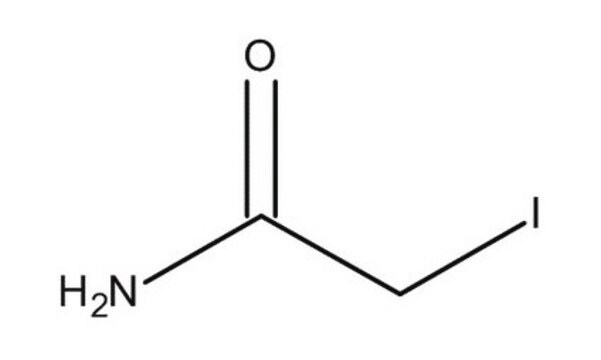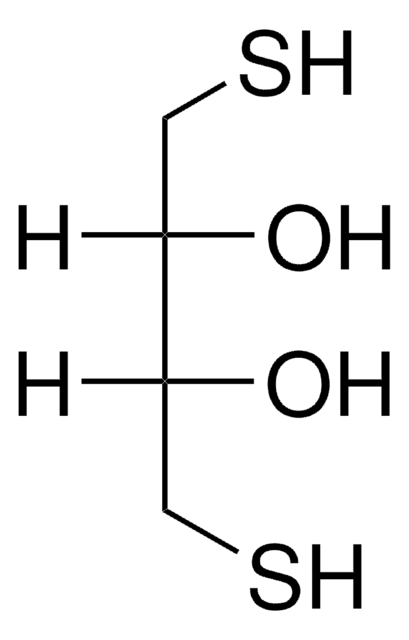I6125
Iodoacétamide
≥99% (NMR), crystalline
Synonyme(s) :
α-Iodoacetamide, 2-Iodoacetamide
About This Item
Produits recommandés
Source biologique
synthetic (organic)
Essai
≥99% (NMR)
Forme
crystalline
Pf
92-95 °C (lit.)
Solubilité
H2O: soluble 0.5 M, clear, colorless
Température de stockage
2-8°C
Chaîne SMILES
NC(=O)CI
InChI
1S/C2H4INO/c3-1-2(4)5/h1H2,(H2,4,5)
Clé InChI
PGLTVOMIXTUURA-UHFFFAOYSA-N
Vous recherchez des produits similaires ? Visite Guide de comparaison des produits
Application
- A Mass Spectrometry Strategy for Protein Quantification Based on the Differential Alkylation of Cysteines Using Iodoacetamide and Acrylamide.: This study presents a novel mass spectrometry method for quantifying proteins by differentially alkylating cysteines with iodoacetamide and acrylamide, enhancing the accuracy of protein quantification in complex samples. (Virág et al., 2024).
- Laminarin ameliorates iodoacetamide-induced functional dyspepsia via modulation of 5-HT(3) receptors and the gut microbiota.: Research demonstrates that laminarin can mitigate functional dyspepsia induced by iodoacetamide through modulating 5-HT(3) receptors and altering gut microbiota composition, offering potential therapeutic benefits. (Liu et al., 2024).
- Redox proteomics in melanoma cells: An optimized protocol.: This paper describes an optimized redox proteomics protocol using iodoacetamide, which facilitates the identification of redox-sensitive proteins in melanoma cells, aiding in the understanding of redox regulation in cancer. (Cunha et al., 2024).
- Molecular targets of cisplatin in HeLa cells explored through competitive activity-based protein profiling strategy.: Utilizing iodoacetamide in competitive activity-based protein profiling, this study identifies molecular targets of cisplatin in HeLa cells, providing insights into the drug′s mechanisms. (Chen et al., 2024).
- Development and Comparison of 4-Thiouridine to Cytidine Base Conversion Reaction.: This research compares base conversion reactions involving 4-thiouridine and cytidine, with iodoacetamide playing a crucial role in the reaction mechanism, contributing to advancements in nucleotide chemistry. (Ohashi et al., 2024).
Actions biochimiques/physiologiques
Mention d'avertissement
Danger
Mentions de danger
Conseils de prudence
Classification des risques
Acute Tox. 3 Oral - Aquatic Chronic 4 - Resp. Sens. 1 - Skin Sens. 1
Code de la classe de stockage
6.1C - Combustible acute toxic Cat.3 / toxic compounds or compounds which causing chronic effects
Classe de danger pour l'eau (WGK)
WGK 3
Point d'éclair (°F)
Not applicable
Point d'éclair (°C)
Not applicable
Équipement de protection individuelle
Eyeshields, Faceshields, Gloves, type P2 (EN 143) respirator cartridges
Faites votre choix parmi les versions les plus récentes :
Déjà en possession de ce produit ?
Retrouvez la documentation relative aux produits que vous avez récemment achetés dans la Bibliothèque de documents.
Les clients ont également consulté
Notre équipe de scientifiques dispose d'une expérience dans tous les secteurs de la recherche, notamment en sciences de la vie, science des matériaux, synthèse chimique, chromatographie, analyse et dans de nombreux autres domaines..
Contacter notre Service technique






